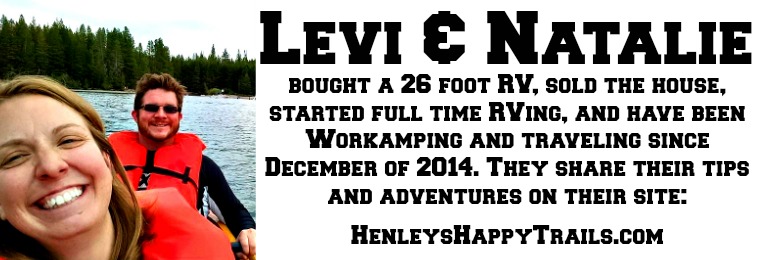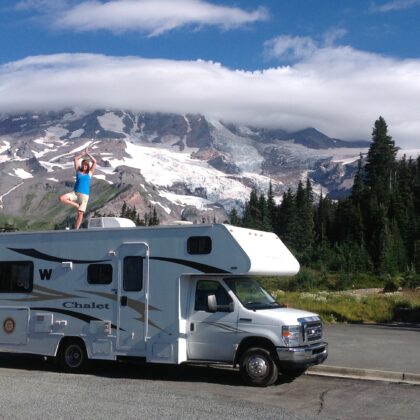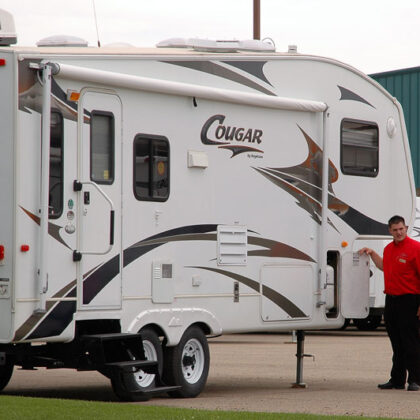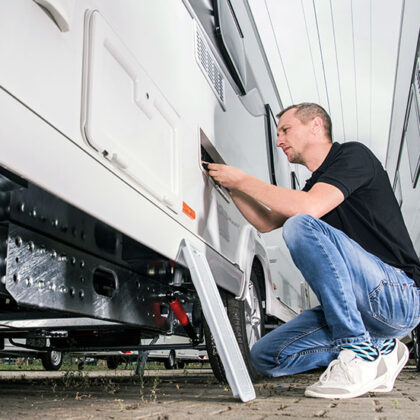When my wife and I were first looking into full time RVing, we read lots of books and blogs about the subject. Every book or blog we read had the following one sentence for couples, “Make sure you love your traveling partner!” This was good advice, but it wasn’t specific. It didn’t help me much. I mean, of course, I love my wife, and I’m pretty certain she loves me. She didn’t marry me for my extensive fortune or Thor-like body.
What spousal horrors did we have in store for us? What could be so difficult that author after author cautioned, “Make sure you love ‘em, man!” I needed detail. Unfortunately, not a single guy who echoed the previous warning was dumb enough to elaborate on what made RV life difficult with his wife. I have decided to take one for the team and elaborate, after almost three years in a drivable box with my wife. Follow along as I dive head first into the shallow end and shoot myself in the foot while putting it in my mouth.
My Space, Your Space, Our Space, Storage Space

Before embarking on our full time RV adventure, we lived in a three story house. Storage space was never an issue. In fact, we had to be creative and create a purpose for all the empty space.
Now that we are living in a 26-foot motorhome, we have to be creative about finding a place for each item. If you already live in an RV, you know what I’m talking about. If you are thinking about moving into one, then try to imagine packing your whole house or apartment into a shed and then living in it.
Obviously, you will forgo taking some stuff and either opt for a storage unit or minimize. There lies the rub. One of you may have more possessions, taking up more precious space. This can cause some tension or an eye roll, the same thing really. You and your partner may have an easy time giving some space up, allowing both parties to keep the things that are important to them. On the other hand, it may not be discussed until someone gets irritated and points this fact out. Regardless, it is something that needs to be thought about while deciding what goes into the rig.
How to Avoid Problems
As with many marital issues, I think communication is the key here. When you are deciding what

NECESSITIES should be in your house-on-wheels, it is important to realize that the other person has a right to take the things that make them happy within reason. It is also imperative that each person lets the other call into question items they find no reason to haul around. The party calling the item into question should also listen to the reasons given for keeping said item.
In our case, I am the one whose stuff takes up the most space. I have camera equipment and way too many t-shirts. I have, over the years, reduced unnecessary items in order to make room for Natalie’s possessions or just more living space. It is important to take a look at yourself and remember that living in a shared space means that sometimes you have to actually share the space. If you are the not the one taking most of the space, decide whether you are OK with getting the smaller piece. If not, ask your partner if there is anything they could do without in order to make some extra room. If you’re looking for some insight about getting rid of unnecessary things, check out Natalie’s article titled, The Art of Getting Rid of Stuff.
Traveling with your Partner

Oddly enough, I am a terrible long distance driver. Some people love the journey; I just want the destination. I don’t like road trips in a car, bus, train, or RV. It’s not that I’m anxious or nervous behind the wheel or in front of the passenger seat. I just don’t like riding in a vehicle for long distances. It’s like banging my head against a wall: painful, no fun, and it feels better when I stop. All of this means that I am a rather grumpy travel partner, at times. Every little issue on a road trip gets on my nerves.
Natalie enjoys road trips, and she is a great driver but a nervous one behind the wheel of the motorhome. I have assured her that the only thing we can’t demolish is a semi on the freeway, but for some odd reason, this has not calmed her nerves. Naturally, this part of her makes her a rather cautious driver (i.e. a slower driver than me). In other words, when Natalie drives, there is a good chance we make it to our destination unharmed, but when I drive, we will probably make it on time.
Getting these two road trip personalities together can result in some maddening travel time. When one person is grumpy, your entire travel day can be extra stressful, especially when that grumpy person is tired and trying to take the wheel as long as possible in order to blaze a trail from point A to B in record time. On the flip side, a nervous person can make the grumpy person feel like they need to drive more; extra grumpiness is added.
Think about how you and your spouse act in the car now. Does one or the other constantly push the imaginary brake on the passenger side? Is it difficult to not have control of the wheel? Do you feel it is your duty to inform the driver of his/her driving prowess or lack thereof? Are you preoccupied with other activities that you forget to give vital directions? Whatever habits are exhibited in the car now will most likely follow suit in the RV; only now you aren’t going to get eggs, you’re going across three states.
How to Avoid Problems
If driving personalities are a problem, it is best to understand yourself. Know that you are probably not going to change the ingrained driving habits of another person. Try to find a way to compromise by acknowledging the other person’s strengths. For example, one of the reasons I loath long distance driving is because it is so under stimulating for periods of time. I have to be talking, watching TV, or reading, constantly. I’m not sure what to label this problem, but I’m guessing any psychologists out there would have an idea.
It is difficult and dangerous to read or watch a show while driving, but I can talk. I mean…I can talk for hours. To give you an idea, I have spent around 1000 words so far telling you to make sure you love your RVing partner. Natalie has found that she doesn’t mind if I talk about anything that comes to my mind while driving. This takes my mind off the fact that I’m on a trip, and Natalie gets the benefit of hearing all the news I discovered while we were at our last stop. She also has the option to tune me out and look at the scenery.
 On Natalie’s end, I have learned that though she drives slower than me, she is a very safe driver which means that I don’t have to run myself ragged by racing to the next stop. I can take the opportunity, as a passenger, to take my eyes off the road for a bit and relax. Her attitude for enjoying the trip can rub off on me, and I have a chance to enjoy the scenery while she drives.
On Natalie’s end, I have learned that though she drives slower than me, she is a very safe driver which means that I don’t have to run myself ragged by racing to the next stop. I can take the opportunity, as a passenger, to take my eyes off the road for a bit and relax. Her attitude for enjoying the trip can rub off on me, and I have a chance to enjoy the scenery while she drives.
My point is, traveling with your partner in an RV is not going to be constant renditions of 99 bottles of beer on the wall and roadside alphabet games. The same problems that plague married couples in the car will plague them in the RV, too. Being honest with yourself, as well as your partner, about driving dynamics can assist with making your travels more pleasurable. Knowing these things can also help you plan trips by giving you an idea of how many miles you want to travel on any given day. We have noticed that we top out at around 250 miles in a day if we can help it.
“When you win an argument, what do you win?” ― Marty Rubin
When you live with someone, you will disagree with them from time to time. This will result in someone getting offended which will lead to an argument. That will lead to one or both of you wanting space. In a house, you may go to another room to cool off. In an RV, you can only glare at the other person from the other end. You could turn your chair around, but it’s not quite the same thing. Arguments can intensify because of the circumstances couples face when moving into an RV. When you live in one location all of the time, you may have a special retreat. It may be a local hangout or an ongoing project in another room of the house. When you are always traveling to new places, you don’t have those options to fall back on, so sometimes it may feel like you have no choice but to glare at them from 15 to 20 feet away.
How to Avoid Problems
If you and your spouse often argue without resolution, help books or counseling may be something to look into. Sometimes people just need alone time to simmer down and think rationally. Always remember that there is an outside to your house-on-wheels. Effective communication is paramount in a marriage, but if you are the one needing to be in a location other than your spouse and the rig is too small to do this effectively, then outside is always a viable option. Taking that walk around the RV park before an argument starts can help clear your head and it’s good for you physically. Running an errand like laundry or mailing a letter are two for ones, completing a task and letting off steam.
Conclusion

Full time RVing with your spouse comes with its own set of challenges. It’s not an impossible task, and although it may have trying moments, it can also bring you and your spouse closer together than ever before. As with many aspects of a relationship, effective, honest communication and a tiny bit of compromise is the key to dealing with the issues that arise.
In the months before moving into their RV, a couple we met a year ago said they started closing off most of the doors in their house in order to only use minimal living space to practice. Talk openly with your partner about concerns you may have living in an RV so there are no surprises when you eventually move in.
I personally feel very blessed that this lifestyle has allowed me to spend so much time with my wife. When I was searching for warm and fuzzy words to end this post, I came across someone else’s words that describe why I love living and working so close to my spouse, despite the challenges it brings.
“Why is it that people get married?
Because we need a witness to our lives.
There are a billion people on the planet.
What does any one life really mean?
But in a marriage, you’re promising to care about everything…
The good things, the bad things, the terrible things, the mundane things,
All of it… all the time, every day.
You’re saying ‘Your life will not go unnoticed because I will notice it.
Your life will not go unwitnessed – because I will be your witness.’”
-Shall We Dance, 2004
If you would like to read more information on the full time RV lifestyle, check out our RVing Info page.
As always….safe travels and happy trails!
Thanks for reading the Gone Workamping blog from Workamper News. Join Workamper.com today to see all the new job opportunities for RVers, as well as the training and resources to confidently find the right Workamping job for you – easily and securely.







